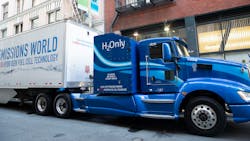I don’t want to imply that people didn’t care about the environment prior to 1970, but April 22, 1970, was the first time a day was set aside for the nation to focus on the environment. In fact, on that day 20 million Americans took part in rallies demonstrating for a healthier, sustainable environment.
Fifty years later we are still celebrating Earth Day on April 22. I started looking into where trucking was 50 years ago, how we got to where we are today in terms of improved efficiency, and where we are headed for the future. The trucking industry has come a long way since 1970, but there is still room for improvement.
During the past 50 years we have seen fuel price at very low levels and soar to nearly $5 a gallon. We’ve been subjected to a variety of rules that lowered emissions sometimes at the expense of fuel efficiency, but there is no doubt that the emissions reductions have been dramatic and resulted in cleaner air. Truck makers and component suppliers worked to design trucks and add-on equipment that would allow for better fuel economy throughout.
In recent years, NACFE has demonstrated that high mileage is possible in both long haul and regional haul operations. A combination of the right base model truck, spec’d with the right powertrain and other components, driven by a someone who is focused on fuel efficiency can put up some significant MPG numbers compared to the national average. The seven drivers in Run on Less 2017 averaged 10.1 MPG over the course of the event, but on some days MPGs were as high as 13. Today many drivers are achieving 10 MPG on a regular basis and others are getting closer and closer. In Run on Less Regional, the 10 drivers got to an 8.3 MPG average. As this sector of the market grows, we expect to see even more improvements and more drivers putting up similar MPG numbers.
What is really most heartening is that there is a genuine interest in information on improving efficiency. On a regular basis, fleets are either downloading our Confidence Reports on existing technologies that can help them improve efficiency, calling us to talk about how they can improve, or participating in events we conduct.
At the same time, existing truck makers and some newcomers to trucking are hard at work developing alternate powertrains for the trucks of the future that will get us to zero emissions. We have seen huge strides in battery electric vehicles and fuel cells to power the trucks of the future.
I’m proud of how far the trucking industry has come from when black smoke billowed out of chrome exhaust stacks to today where we have reduced emissions levels while improving the miles we get from a gallon of fuel. And now on the verge of zero emissions goods movement.
I can't help but be excited to see where we will be on our efficiency journey on the subsequent anniversaries of Earth Day. In the meantime, let’s celebrate how far we've come but keep striving to be even better in our efforts to be more Earth-friendly.
About the Author

Michael Roeth
Executive Director
Michael Roeth is the executive director of the North American Council for Freight Efficiency. He serves on the second National Academy of Sciences Committee on Technologies and Approaches for Reducing the Fuel Consumption of Medium and Heavy-Duty Vehicles and has held various positions with Navistar and Behr/Cummins.
